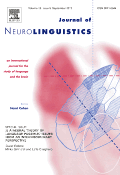
EXPERIMENTAL BRAIN RESEARCH
Scope & Guideline
Exploring the Frontiers of Brain Function and Disorders
Introduction
Aims and Scopes
- Neuroscience and Motor Control:
The journal emphasizes studies that explore the neural mechanisms underlying motor control, including motor learning, adaptation, and coordination across different populations, such as those with neurological disorders. - Sensory Processing and Integration:
Research focusing on how sensory information is processed and integrated in the brain, particularly in relation to proprioception, visual and auditory stimuli, and their impact on motor responses. - Cognitive Neuroscience:
Investigations into cognitive processes such as attention, memory, and decision-making, particularly how these processes interact with motor functions and sensory input. - Clinical Applications and Interventions:
Studies that explore the clinical implications of neuroscience research, including rehabilitation strategies for individuals with neurological impairments, and the effects of various interventions such as transcranial magnetic stimulation or exercise on brain function. - Experimental Methodologies:
The journal promotes innovative experimental designs and methodologies, including neuroimaging techniques, electrophysiological recordings, and behavioral assessments to elucidate brain function.
Trending and Emerging
- Neuroplasticity and Rehabilitation:
There is a growing emphasis on understanding neuroplasticity and its implications for rehabilitation in various populations, especially following injury or neurological disorders. - Multisensory Integration:
Research focusing on how different sensory modalities interact and affect motor control is becoming increasingly prominent, reflecting the complexity of real-world tasks. - Technological Innovations in Assessment:
The use of advanced technologies such as virtual reality and neuroimaging techniques for assessing cognitive and motor functions is on the rise, allowing for more nuanced insights into brain-behavior relationships. - Aging and Neurodegeneration:
An increase in studies examining the effects of aging on brain function and the mechanisms of neurodegenerative diseases, particularly in relation to motor control and cognitive decline. - Psychological and Emotional Influences on Motor Control:
Emerging research explores the intersection of emotional states, psychological factors, and their impact on motor performance and sensory processing, indicating a holistic approach to understanding behavior.
Declining or Waning
- Basic Neurophysiology:
There has been a noticeable decline in studies solely focused on basic neurophysiological mechanisms without direct application to behavior or clinical relevance, reflecting a shift towards more applied research. - Animal Models of Disease:
Research utilizing animal models for basic neuroscience inquiries seems to be waning, as the journal increasingly emphasizes translational studies that bridge laboratory findings with human applications. - Traditional Cognitive Assessments:
The use of conventional cognitive assessments in isolation is decreasing as researchers lean towards more integrated approaches that combine cognitive tasks with neurophysiological measures.
Similar Journals

Neuropsychologia
Charting New Territories in Experimental Psychology and NeuroscienceNeuropsychologia, published by PERGAMON-ELSEVIER SCIENCE LTD, is a premier journal that delves into the intersections of psychology and neuroscience, specifically focusing on behavioral and cognitive processes. Since its inception in 1963, this esteemed journal has been a vital platform for researchers, professionals, and students, showcasing innovative studies and advancements in the fields of Behavioral Neuroscience, Cognitive Neuroscience, and Experimental Psychology. With a commendable impact factor, placing it in the Q2 category across multiple disciplines, Neuropsychologia is recognized for its contribution to the scientific community, ranking among the top journals in both Experimental and Cognitive Psychology and Neuroscience. The journal's commitment to excellence is evident in its rigorous peer-review process and its mission to disseminate cutting-edge research, making it an invaluable resource for those seeking to expand their knowledge and insights in neuropsychology. For further reading, the journal is accessible in both print and digital formats, ensuring that researchers can easily engage with the latest findings and theoretical advancements in this dynamic field.

I-Perception
Pioneering New Perspectives in Perception StudiesI-Perception is a leading open-access journal published by SAGE Publications Ltd, specializing in the intricate interplay between perceptual processes across various disciplines such as Artificial Intelligence, Experimental and Cognitive Psychology, Ophthalmology, and Sensory Systems. With an ISSN of 2041-6695, this UK-based journal has been a vital resource since its inception in 2010. I-Perception occupies esteemed positions within several academic categories, including a Q2 ranking in Ophthalmology and Q3 rankings in both Artificial Intelligence and Experimental and Cognitive Psychology. These metrics highlight the journal’s relevance and impact, particularly in fostering interdisciplinary collaborations among researchers and practitioners. Accessible online, I-Perception encourages the dissemination of innovative findings and theoretical advancements, making it an essential platform for those passionate about understanding perception in its myriad forms. The journal's commitment to excellence is further reflected in its Scopus rankings, showcasing its influence within the respective realms of Medicine, Neuroscience, and Computer Science.

JOURNAL OF MOTOR BEHAVIOR
Pioneering Research in Motor Behavior and PerformanceJOURNAL OF MOTOR BEHAVIOR, published by Routledge Journals, Taylor & Francis Ltd, is a leading platform that explores critical insights into the dynamics of motor functions and behavior across various disciplines including biophysics, cognitive neuroscience, and sports science. With an ISSN of 0022-2895 and an E-ISSN of 1940-1027, this journal has been a vital resource since its inception in 1969, offering a comprehensive analysis of motor control, skill acquisition, and the neural mechanisms underlying motor performance. Positioned in the Q3 quartile across multiple categories for 2023, it ranks competitively within its fields, such as #136 in Orthopedics & Sports Medicine and #95 in Experimental & Cognitive Psychology. JOURNAL OF MOTOR BEHAVIOR serves not only as an essential reference for researchers and professionals but also as an invaluable resource for students pursuing studies in motor behavior and related areas, reflecting the ongoing evolution and significance of this field in enhancing our understanding of human movement and performance.

BRAIN RESEARCH
Advancing the frontiers of neuroscience.BRAIN RESEARCH is a premier journal published by Elsevier, specializing in the intricate domains of neuroscience, developmental biology, and molecular biology. Established in 1966, this esteemed publication has become a cornerstone for researchers, professionals, and students dedicated to advancing our understanding of brain function and disorders. With an impressive impact factor and a consistent presence in the Q2 quartiles across key categories—such as Developmental Biology, Neurology, and Neuroscience—it stands out as an essential resource for disseminating innovative research and pioneering insights. The journal's scope encompasses both clinical and fundamental studies, fostering a multidisciplinary approach to the complexities of neural systems. Although it is not an open-access journal, BRAIN RESEARCH provides a vital platform for sharing progressive findings that can inspire future studies and contribute significantly to the evolutionary discourse in neuroscience. Based in the Netherlands, at RADARWEG 29, 1043 NX AMSTERDAM, BRAIN RESEARCH continues to shape the landscape of neuroscience research, inviting submissions that explore the latest discoveries and therapeutic strategies.

JOURNAL OF EXPERIMENTAL PSYCHOLOGY-HUMAN PERCEPTION AND PERFORMANCE
Exploring the depths of cognitive processes and behavior.JOURNAL OF EXPERIMENTAL PSYCHOLOGY: HUMAN PERCEPTION AND PERFORMANCE, published by the American Psychological Association, stands as a premier outlet for scholarly research in the fields of psychology and neuroscience. This esteemed journal, identified by its ISSN 0096-1523 and E-ISSN 1939-1277, provides an essential platform for groundbreaking studies focusing on human perception, cognitive processes, and performance. With a remarkable impact reflected in its Q1 ranking across multiple categories including Arts and Humanities, Behavioral Neuroscience, and Experimental and Cognitive Psychology, this journal maintains a prestigious position in academic discourse. Researchers and practitioners can look forward to contributing to and accessing a repository of knowledge that spans nearly five decades, with articles that adhere to the highest scientific standards. As a valuable resource without open access constraints, it invites a wide readership engaged in advancing psychological science and understanding the intricacies of human behavior.

NEUROREPORT
Innovating research in neurobiology and beyond.NEUROREPORT is a distinguished journal in the field of neuroscience, published by Lippincott Williams & Wilkins. With an ISSN of 0959-4965 and an E-ISSN of 1473-558X, the journal has established itself as a vital platform for disseminating innovative research and developments in the dynamic area of neuroscience since its inception in 1990. Currently, it is positioned in the Q3 category of the 2023 Journal Rankings, reflecting its respectable standing within the community of neuroscience professionals, ranked #74 out of 113 in general neuroscience on Scopus, placing it in the 34th percentile. While it operates on a traditional subscription model, NEUROREPORT is committed to fostering knowledge sharing in the realm of neurobiology, neuropharmacology, and cognitive studies among researchers, professionals, and students alike. With its broad scope and commitment to scientific excellence, the journal continues to be a cornerstone for those seeking to stay ahead in the evolving landscape of neurological research.

Multisensory Research
Unveiling the Complexity of Human PerceptionMultisensory Research is a premier academic journal published by BRILL, dedicated to advancing the fields of cognitive neuroscience, computer vision, and sensory systems. Established in the Netherlands, the journal boasts a diverse scope, exploring the integration of sensory modalities in both experimental and cognitive psychology. With its converged years extending from 2013 to 2024, Multisensory Research has consistently contributed valuable insights, earning a well-regarded position within various quartiles, notably Q2 in Computer Vision and Pattern Recognition and Q2 in Ophthalmology as of 2023. The journal’s rankings reflect its significant impact, with placements such as rank #50 in Ophthalmology and rank #84 in Experimental Psychology, highlighting its relevance to today's interdisciplinary research efforts. Available as an open-access platform, Multisensory Research ensures that innovative research is accessible to a wide audience, making it an essential resource for researchers, professionals, and students alike who are engaged in the dynamic study of multisensory integration.

Cognitive Neurodynamics
Advancing Understanding in Cognitive Neuroscience.Cognitive Neurodynamics is a leading journal in the field of cognitive neuroscience, published by Springer in the Netherlands. With an ISSN of 1871-4080 and an E-ISSN of 1871-4099, this journal has established itself as a prominent platform for innovative research from its inception in 2007, continuing to enrich the academic landscape through 2024. Recognized for its significant contributions, Cognitive Neurodynamics holds a Q2 quartile ranking in cognitive neuroscience and impressively ranks #27 out of 115 in the Scopus database, placing it in the 76th percentile among its peers. While the journal is not open access, it offers a wealth of studies focusing on the intricate dynamics of cognitive processes and neurobiological mechanisms, making it essential reading for researchers, professionals, and students alike. Its objective is to bridge the gap between theoretical insights and practical applications, fostering a deeper understanding of cognition through multidisciplinary approaches. Explore the latest advancements in cognitive dynamics and contribute to the evolving dialogue within this fascinating field.

JOURNAL OF NEUROLINGUISTICS
Charting New Territories in Neurolinguistic ResearchJOURNAL OF NEUROLINGUISTICS, published by Pergamon-Elsevier Science Ltd, is a premier academic journal that rigorously explores the intersection of language and the brain, emphasizing the cognitive and neurological underpinnings of linguistic processes. With an ISSN of 0911-6044 and an E-ISSN of 1873-8052, this journal has established itself as a crucial resource for researchers, professionals, and students in the fields of linguistics, cognitive neuroscience, and psychology. Boasting an impressive Q1 classification in Linguistics and Language and Arts and Humanities (miscellaneous) for 2023, the journal demonstrates significant impact, having achieved a ranking within the 91st percentile in Linguistics and Language according to Scopus rankings. The scope of the journal spans comprehensive studies from 1985 to 2025, reflecting a long-standing commitment to advancing the understanding of how language interacts with human cognition. Although it does not currently offer open access, its relevance extends well beyond its articles, contributing to ongoing scholarly dialogues and fostering new insights in the study of neurolinguistics.

Frontiers in Human Neuroscience
Bridging Neuroscience with Behavioral InsightsFrontiers in Human Neuroscience is a premier open access journal published by FRONTIERS MEDIA SA, dedicated to advancing the understanding of the complexities of human neuroscience. With an ISSN of 1662-5161, the journal has established its prominence in various fields, achieving a Q2 ranking in categories such as Behavioral Neuroscience, Neuropsychology and Physiological Psychology, and Psychiatry and Mental Health as of 2023. Since its inception in 2008, Frontiers in Human Neuroscience has consistently contributed to the scholarly dialogue by offering a platform for innovative research that bridges the gap between neuroscience and behavioral science. The journal's rigorous peer-review process and commitment to open access ensures that findings are readily available, promoting collaboration and progress within the academic community. With an impact on neuroscience disciplines, it stands at the forefront of the field, inviting researchers, professionals, and students alike to engage with cutting-edge studies and developments. The journal's address is located in Lausanne, Switzerland, where it continues to flourish as a hub for neurobiological exploration.